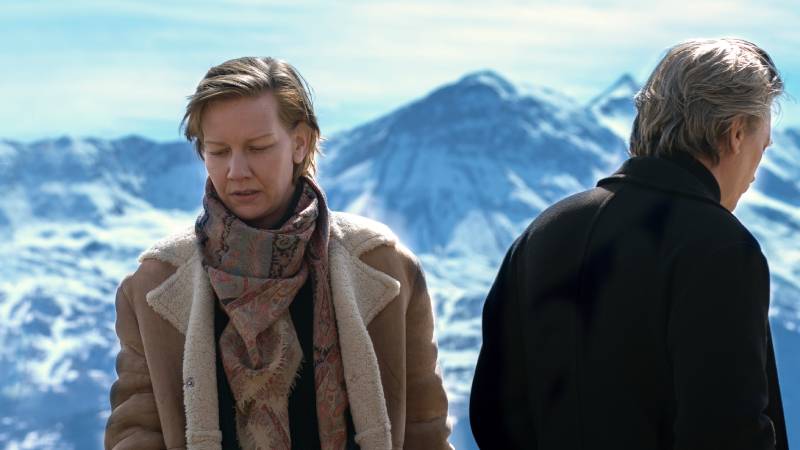




It is not often that a courtroom drama keeps audiences hooked for 150 minutes. Anatomy of a Fall deep dives into the psychology of Sandra (Sandra Hüller), a 40-something-year-old writer fighting to prove her innocence after her husband Samuel (Samuel Theis) dies by faling from from the top level of the couple’s sumptuous residence on the Alps, near town of Grenoble. Sandra is a German writer who met her French writer husband in London, and hesitantly agreed to move to France. They have a visually impaired child around eight years of age called Daniel (Milo Machado Graner). The boy is the first person to come across his father’s lifeless body outside their house, lying on a pool of blood.
The title refers to the fall that claimed Samuel’s life, and also to the collapse of Sandra’s existence following her indictment. During the court proceedings, she describes yet another fall: her husband was experiencing a mental breakdown and had previously attempted suicide. Despite mounting evidence suggesting that Sandra may have indeed killed her husband, a clear motif is absent, and Hüller’s quietly moving, heartfelt performance ensures that our allegiance remains with her character throughout the movie. Why would such a calm, intelligent and loving wife and mother take the life of the person whom she married years earlier, and claims to have loved until the end of his life?
This isn’t the first tragedy to afflict the family. Years earlier, Daniel was involved in a car accident while under the care of his father. His optical never was damaged and he was left virtually blind for the rest of his life. The event has enormous repercussions for the couple, as they became consumed with guilt and grief. This is when their relationship began to collapse (yet another “fall” to be anatomically examined). Their sex life drew to an abrupt. Arguments became a regular occurrence. Finger pointing and competition prevailed. Sandra initially blamed Samuel for the accident, and he lapsed into clinical depression. His therapist attends court, painting yet a very dark image of Sandra.
The films offers a vigorous debate into the symbiotic relationship between fiction and reality. Sandra is a successful writer, and her books often mirror her own predicament. She briefly describes mariticide in one of her latest pieces. Does literature emulate reality, or is it the other way around? Or should the two never mix? This is a question repeatedly raised in court as the prosecutor (in an electrifying performance by Antoine Reinartz) attempts to draw a parallel between the defendant and the characters that she concocted. Samuel accuses his wife of “plundering” his work because she transformed a passage he wrote into a best-selling novel, we learn from an audio recording played in court (which Samuel captured without her knowledge during a heated argument). He was increasingly frustrated at his inability to write, and jealous of his wife is more ways than one (creatively, professionally and romantically).

Sandra’s hesitation to speak French at home combined with her inability to do so in court, despite having lived in the country for many years and possessing reasonable command of Voltaire’s language, adds a touch of ambiguity to character. Is she a vulnerable woman forced to live in a country against her will, or is she a manipulative crook unwilling to conform and play by the rules? Language skills become a gauge for honesty and vulnerability.
The multi-threaded, carefully elaborate script has no loose ends whatsoever. Every line fulfils a purpose. Every twist has a cognitive function. None of the characters is flat, but instead erring human in search of coherence and absolution. This is combined with an efficiently frugal cinematography to deliver a credible piece of fiction. At times, it feels like the film based on a real story? Other times, it feels like the figment of the imagination of a scriptwriter. Once again, the line between fiction and reality becomes blurry.
Hüller delivers a once-in-a-lifetime performance. The 45-year-old German actress has the hypnotic charms of a young Charlotte Rampling, combined with the confidence of Isabelle Huppert. She portrays a strong woman forced to confront her demons, and to expose the most intimate details of her life (such as the fact that she’s bisexual, and has had several extramarital in the past few years) not just to court but to the entire nation (news from the trial are routinely broadcast on television, with commentators sharing their own judgments). The small Daniel listens as the love affairs and NSFW misadventures of his mother are laid bare.
Anatomy of a Fall premiered in the Official Competition of the 76th Cannes Film Festival. Sandra Hüller is also in the lead of Jonathan Glazer’s The Zone of Interest (in an equally impressive performance, if a little more self-contained), when this piece was originally written. It won th Palme d’Or. It also shows in San Sebastian and at the Tallinn Black Nights Film Festival. In UK cinemas on Friday, November 10th. On various streaming platforms on Tuesday, January 3rd.
https://www.youtube.com/watch?v=6toqRpPY1LE





















